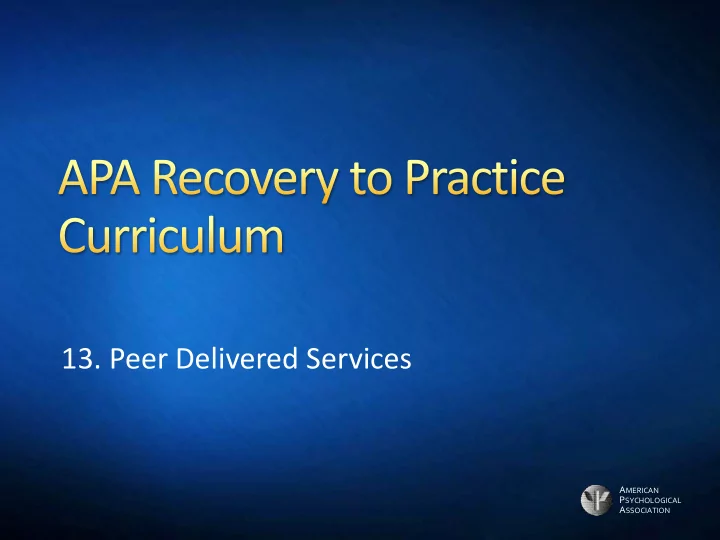

13. Peer Delivered Services A MERICAN P SYCHOLOGICAL A SSOCIATION
Value of Peer Delivered Services People with Serious Mental Illnesses consistently report that receiving services from others with similar illnesses is one of the most helpful services they receive Characteristics Peer providers can be current or former users of mental health services Peer providers have recovered sufficiently to be able to help others with similar issues A MERICAN P SYCHOLOGICAL A SSOCIATION
Models of Peer Delivered Services Peer led self help interventions that can involve sharing experiences, offering information, e.g., in a mutual support education group, or teaching others how to develop a recovery plan Telephone services such as a “warm” line Peer operated and managed services Traditional mental health services such as case management delivered by peer providers within the mental health system Peer support programs, either in a traditional mental health service, or in an agency outside the mental health system – this is the most common A MERICAN P SYCHOLOGICAL A SSOCIATION
What do Peer Support Providers Do? Anything that can help! Examples include: Listening Sharing own experiences and offering support, hope, encouragement, mentoring Providing information and education about how to stay well, recognize signs of distress Modeling behaviors to take responsibility for wellness and stay healthy Practical advice about housing, medications, schooling, employment, government entitlement programs A MERICAN P SYCHOLOGICAL A SSOCIATION
Benefits for Recipients of Peer Services More engaged and more involved in treatment Longer community tenure between hospitalization and fewer days in hospital Symptom stability, self-esteem, empowerment, coping skills, social support Facilitation of community integration Benefits for Peer Providers Increased confidence in their abilities Increased ability to cope with their own illness Increased self esteem, sense of empowerment and hope A MERICAN P SYCHOLOGICAL A SSOCIATION
Implementation Considerations Personal Concerns Confidentiality Role Identity and Boundaries Dual Relationships Administrative Concerns Not Standard Adequate Compensation Cultural and Gender Issues Environment of Acceptance Adequate Supervision A MERICAN P SYCHOLOGICAL A SSOCIATION
Citation for this Module: American Psychological Association & Jansen, M. A. (2014). Peer Delivered Services. Reframing Psychology for the Emerging Health Care Environment: Recovery Curriculum for People with Serious Mental Illnesses and Behavioral Health Disorders. Washington, DC: American Psychological Association. www.apa.org/pi/rtp Citation for the full Curriculum: American Psychological Association & Jansen, M. A. (2014). Reframing Psychology for the Emerging Health Care Environment: Recovery Curriculum for People with Serious Mental Illnesses and Behavioral Health Disorders. Washington, DC: American Psychological Association. mjansen@bayviewbehavioral.org or jansenm@shaw.ca August, 2014 A MERICAN P SYCHOLOGICAL A SSOCIATION
Recommend
More recommend